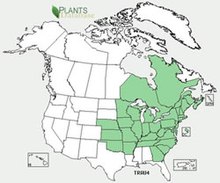Triosteum aurantiacum
Appearance
This article may require cleanup to meet Wikipedia's quality standards. The specific problem is: Please make sure the authors and titles of the articles you're citing clearly appear in each footnote. You might find it easier to do your footnotes by clicking the "Cite" menu just above your editing window, which provides you a template to fill out and formats the coding for you. (May 2018) |
| Triosteum aurantiacum | |
|---|---|

| |
| Scientific classification | |
| Kingdom: | Plantae |
| Clade: | Tracheophytes |
| Clade: | Angiosperms |
| Clade: | Eudicots |
| Clade: | Asterids |
| Order: | Dipsacales |
| Family: | Caprifoliaceae |
| Genus: | Triosteum |
| Species: | T. aurantiacum
|
| Binomial name | |
| Triosteum aurantiacum | |

| |
| Triosteum aurantiacum range | |
Triosteum aurantiacum, also known as orangefruit horse-gentian, is a perennial[1] species of Triosteum native to North America. [2]
Growth
[edit]Triosteum aurantiacum may grow from 2 to 4 feet (0.6 to 1.2 m) in height.[3]
Use
[edit]Triosteum aurantiacum has been used to treat a variety of medical issues by Native Americans, and can be used as a coffee substitute when roasted.[3]
References
[edit]- ^ USDA, NRCS (n.d.). "Triosteum aurantiacum". The PLANTS Database (plants.usda.gov). Greensboro, North Carolina: National Plant Data Team. Retrieved 10 May 2018.
- ^ "Triosteum aurantiacum". Integrated Taxonomic Information System. Retrieved 10 May 2018.
- ^ a b Samuel Hein. "Orange-Fruited Horse Gentian (Triosteum aurantiacum)". Plant-of-the-week. USDA Forest Service. Retrieved 10 May 2018.

